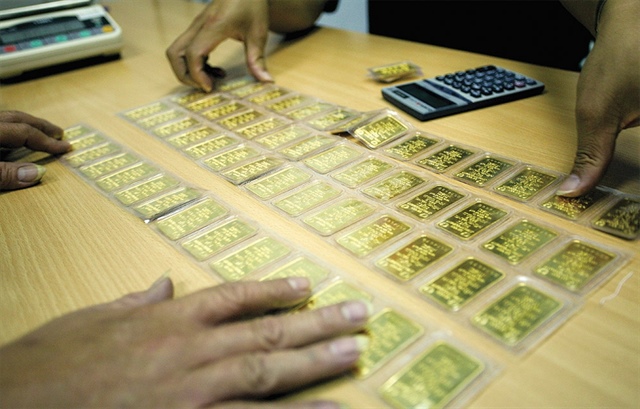Gold monopoly policy retooling in the works
Gold monopoly policy retooling in the works
In a landmark move to liberalise its gold market, Vietnam is set to dismantle the state’s long-standing monopoly on gold bullion production and use e-invoices for transactions.

Gold monopoly policy retooling in the works, Photo: Le Toan |
The prime minister has instructed a streamlined amendment of Decree No.24/2012/ND-CP on gold trading, alongside research and investment in systems enabling the issuance of electronic invoices directly for gold transactions, with the entire process required to be completed within June.
In mid-June, the State Bank of Vietnam (SBV) released a draft decree amending and supplementing several provisions of Decree 24, which governs the management of gold trading activities.
Under the draft, the scope of regulation is expanded to include gold bullion production, effectively ending the state’s monopoly over gold bullion manufacturing. The revised scope covers the production, processing, and trading of gold jewellery and fine arts; the production and trading of gold bullion; gold import and export activities; and other forms of gold trading such as account-based and derivative gold transactions.
A key provision in the draft mandates that all gold transactions valued at $800 or more must be conducted via bank accounts to enhance transparency and trace cash flows. In addition, transactions involving raw gold between credit institutions and enterprises must be invoiced electronically, with transaction data stored and connected to the relevant authorities.
The draft is currently undergoing public consultation and further refinement, with the overarching objective of establishing a comprehensive legal framework, modernising gold market governance, safeguarding the financial system, curbing speculation, and improving transaction transparency.
Dao Xuan Tuan, director general of the SBV’s Foreign Exchange Management Department, said, “The draft decree proposes ending the state monopoly on gold bullion production and gold material import-export. The new mechanism empowers the SBV to issue licences to eligible enterprises and banks, allowing them to produce gold bullion, import gold material for bullion production, and supply gold for jewellery and handicrafts.”
Responding to questions on whether the issues of monopoly over bullion branding and gold importation would be addressed in the revised decree, Tuan said that based on macroeconomic and monetary developments, as well as policy objectives and market conditions, the SBV would allocate appropriate import quotas to qualified enterprises and banks.
“This approach not only dismantles the state monopoly but also ensures strict oversight of the gold bullion market in terms of both production and raw gold importation,” he added.
The state’s regulatory role is further underscored by requirements for enterprises and banks to disclose gold standards, establish internal gold trading rules, maintain detailed records, and report to the authorities, Tuan added.
“As a result, more businesses and banks will be licensed to launch their own gold bullion brands. The draft also mandates bank payments and e-invoicing to foster greater transparency in gold trading,” he said.
National Assembly deputy Trinh Xuan An remarked that Vietnam’s gold market has never truly operated under market principles, and Decree 24 has long become outdated.
“A controlled removal of the gold bullion monopoly means the state still manages bullion production but can license multiple qualified enterprises to participate,” he explained. “The goal is not to allow any one enterprise or institution to monopolise the market, but to enable a limited number of qualified players to engage in import, refining, and trading. Market operations should follow the principles of supply and demand, with only macro-level policy interventions, there should be no specific interference dictating who may buy or sell gold.”
Assigning gold sales exclusively to credit institutions is inconsistent with a market-based approach, he added. An also emphasised that gold should not become a haven for idle money, a vehicle for illicit transactions, or a speculative asset class.
“The establishment of a national gold exchange should be seriously studied and implemented soon,” he said. “However, this platform must not be another unofficial or speculative trading floor like those in the past. It must meet requirements of transparency, traceability, and regulatory oversight. If it is to function as a true market, it must adhere to fundamental market rules with products must have verifiable origins to prevent money laundering and unlawful activity.”
However, in its recent commentary on the draft, the Vietnam Gold Traders Association (VGTA) proposed removing the requirement for enterprises to obtain a gold bullion trading licence and the condition of having a minimum charter capital of $40 million to be eligible for bullion production.
Currently, 38 enterprises and banks are licensed to buy and sell gold bullion. But under the existing charter capital requirement, only PNJ, DOJI, and SJC qualify. Among banks, only a few such as Vietcombank, VPBank, Techcombank, and BIDV have charter capital exceeding $2 billion, which raises concerns of a renewed supply monopoly.
The VGTA urged reconsideration of the draft’s provision that allows the central bank to organise gold bullion production periodically.
“The SBV is the regulatory authority overseeing gold trading, not a commercial producer. If it engages in bullion production, questions arise as to which body would oversee its dual role in both regulation and business,” the VGTA said.
“If the SBV becomes a gold bullion supplier, it could create public and investor bias towards SBV-branded bullion, echoing past issues,” the VGTA continued. “This would undermine efforts to diversify supply through multiple brands and reduce market prices. Instead, demand may concentrate on SBV-branded bullion, putting pressure on the SBV to meet this demand, pushing prices higher, and distorting the bullion market.”
- 16:00 02/07/2025


























